#during 'the son has not surpassed the father' scene i had to put the book down bc i got hit so hard with the urge to start ripping pages ou
Text
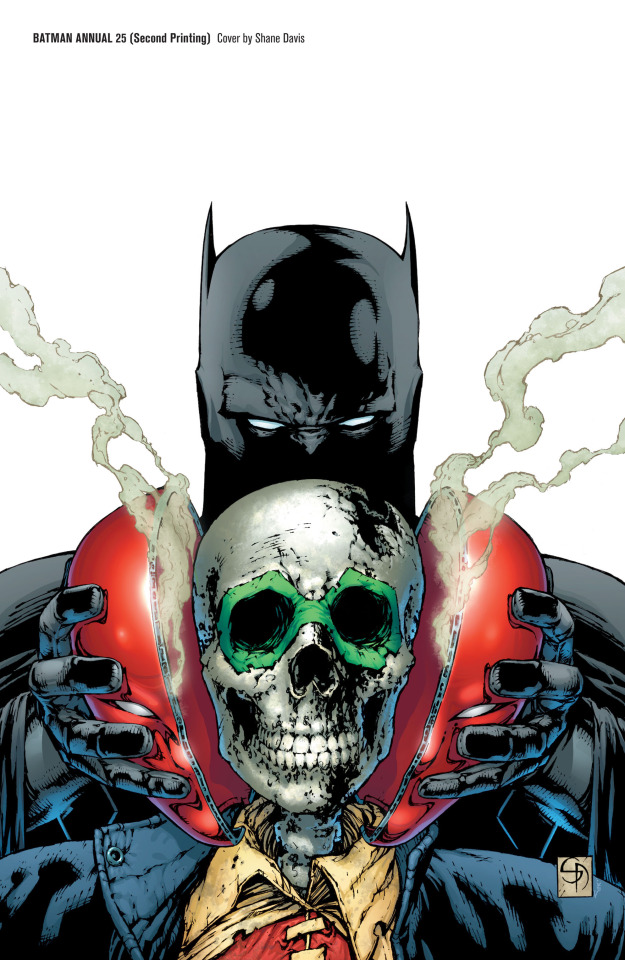
i love this one. btw. if you even care.
#no coherent thoughts just hhghhghjhfgmhghgh........#btw i didnt realize it but its been nearly EXACTLY 2 years since i first read utrh#bc i first watched the movie ~late august 2021 then read the book a few days later#and now i read it again <3 so i guess we can all start getting ready for my next reread in august 2025#anyways it hits even better now that i have a Nuanced Interpretation of the characters :)#during 'the son has not surpassed the father' scene i had to put the book down bc i got hit so hard with the urge to start ripping pages ou#so insane about this book it turns me into a rabid animal#jason todd#dc
1K notes
·
View notes
Note
Another question about the timeline, where do you see Baku's visit to Eba's building and where does he learn the truth about Hal fit in (chapters 534-535)? I say this because during chapter 324, in a flashback that takes place after the bet against President Sakai (which happens before Baku goes to the Eba building) Baku thinks that Kyara will be a real ally when he stops being a referee, giving us the idea that Baku did plan from the beginning to lose the first Surpassing the Leader, which provokes another question, if at that time Baku didn't know that Hal would be the next leader, how could he predict that he would survive in the face of such a bet?
Sorry for English, it's not my first language.
dont worry about your english its good ^-^ its also not my first language so if u need me to rephrase something u can just ask :]
so i dont really know when baku visits eba's building exactly because its kept vague... but i agree it makes the most sense if its after the gamble vs sakai, i dont think we have a date for this? & it also has to be after nov 20th because thats when eba records the message, but before nov 23rd because thats when hal has the game vs fukurou so maybe its like this?
nov 20th (eba records the message intended for souichi)
nov 21st the gamble vs Sakai in the restaurant?
nov 22nd baku enters eba's building and finds out the truth about hal?
nov 23rd hal goes to bakus gamble in his place
i need to reread the 1998 flashbacks i might be missing some cues. the Sakai gambles (vs the son and the next day vs the father at the restaurant) could happen before nov 20th? but not too much before because i doubt eba would only record the message for souichi like 4 days after souichi got the book??? what would happen if he got here too quick and there was no message? after making the book, recording the message would probably be the first thing he does i think. im also biased towards putting baku's discovery of hal's secret as close as possible to the gamble vs fukurou cause thats the most dramatic and heartbreaking timing for things lol
for the foreshadowing about kyara becoming a real ally, the manga loves to make us question how much baku has stuff planned in advance- like, is he really SO GOOD he knew all along it would turn out like this? i think he genuinely loves risking his life and happens to have fate on his side. he DOES have plans but can he forsee things 2 years into the future? could he really know kyara would leave kakerou if baku lost surpassing the leader? i think this bit about kyara is probably one of these cases, like a stray thought he kept in his head for later, maybe he thought kyara might leave kakerou before?
and whether baku KNEW hed survive surpassing the leader or not is also one of those big questions. i think its yakou that first makes the theory, right? that baku lost on purpose and planned it all along? i think its true he did lose on purpose but only once he got there on april 9th. but that last part is my own speculation so with that in mind heres my theory for april 9th
i think after hal took his place for the nov 23rd gamble and never came back, baku was smart enough to know it meant hal died. i dont think he had any reason to think he couldve survived, somehow, so when challenging STL in 2001 when he has THIS LOOK
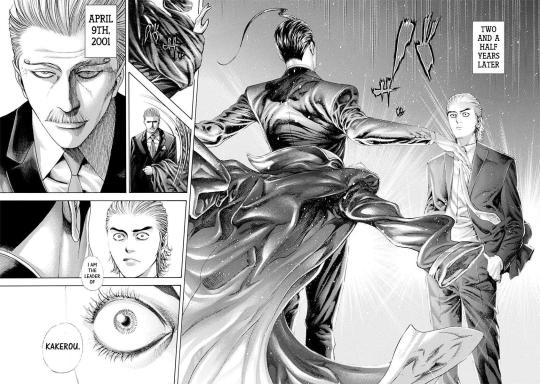
i think its because hes shocked to see hal (/souichi) alive. he truly believed he was dead and now hes realizing hes going to play STL with hal. and in that instant i think he makes the decision to lose on purpose because he thinks, if its hal, i will survive, he wont kill me. i think he had a more elaborate plan for the gamble but he didnt use it because he didnt expect hal being there and so instead he seizes THIS opportunity to be the funniest gambler in the history of kakerou and lose STL on purpose and still live LOL + kick in the mangas whole story (or he didnt have the heart to win against hal and kill him "again", you can choose your reading of this scene)
so baku finds out hal is a liar & a kiruma -> the next day hal takes his place in the gamble and dies -> 1.5 years later it turns out hal is alive & the leader of kakerou now??? AND HE HAS TO KILL HIM??? -> insane little plan to lose & survive and re-challenge souichi later. this is sooo messy and heartbreaking and i love it which is why its my interpretation of the events i just really love the tragedy between baku & souichi 🐝
#ask#anon#usogui timeline#usogui meta#also i couldnt find the kyara thing in chapter 324 :( i skimmed through the restaurant gamble n didnt see it either but it was real quick#i totally couldve just missed it
5 notes
·
View notes
Text
TOP 12 FAVORITE IAN HOLM ROLES
@superkingofpriderock @amalthea9 @ohiwannatakeyouhome
DAVID PETERS (MOONLIGHT ON THE HIGHWAY, 1969)
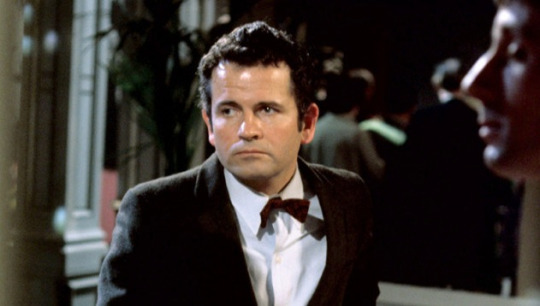
A troubled young man, David Peters (Ian Holm), claims, "Once dreams were possible, that's what the popular songs told us." Rejecting rock music of the day, Peters is immersed in the tunes of Thirties crooner Al Bowlly (killed during the London blitz). He collects Bowlly memorabilia, publishes the Bowlly fan-club newsletter, and finds pleasure in lip-synching Bowlly records but his obsession with Bowlly masks certain darker events in his past.
DOCTOR ASTROV (UNCLE VANYA, 1991)
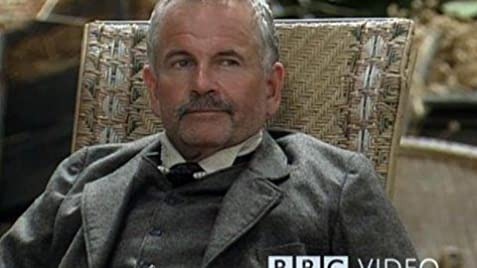
In this televised production of Anton Chekhov’s play, Sir Ian Holm plays a village medic who, at the start, is an idealist with great passion for the preservation of trees. But, as time passes, everyone ignores what he says and he falls in love with a married woman, the character of Doctor Astrov slowly grows more and more tired and disappointed with himself, the world and humanity, fallin in alcoholism.
POD CLOCK (THE BORROWERS AND RETURN OF THE BORROWERS, 1992-93)
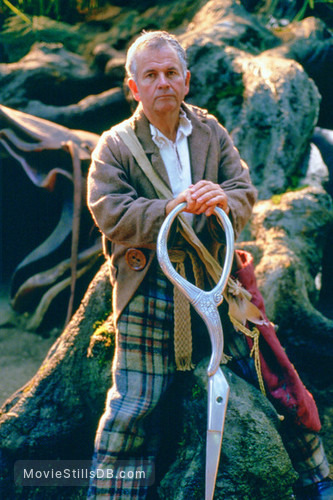
I dare say that, despite being 61 years old at the time, this is the role in wich i felt Sir Ian Holm performed the most of phisical acting. Pod Clock is the patriarch of a family of people that are the size of little fingers, and to raise his family, he has to ride sinks, run away from cats and big birds and be carefull of mouse traps to borrow food and other needs. All the while trying to avoid being seen by humans. That’s what i call an action hero.
ASH (ALIEN, 1979)
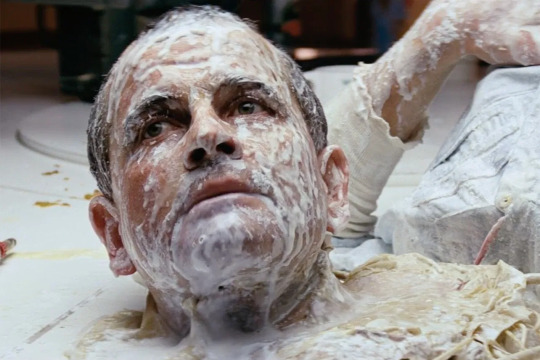
The amoral android that made him a movie star. Do i need to say more?
CAPTAIN FLUELLEN (HENRY V, 1989)
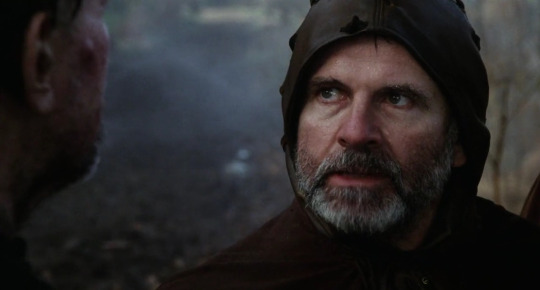
In this Kenneth Branagh adaptation of the William Shakespeare historical play, we see Sir Ian Holm performance as Captain Fluellen, a man that is a geek of military tactics history as he is proud of being welsh. Fluellen has a fun energy that makes him likable, at the same time that he is intimidating in his ruthleness in support a cruel execution in the name of military discipline.
VICTOR FRANKENSTEIN/THE CREATURE (MISTERY AND IMAGINATION: FRANKENSTEIN, 1968)
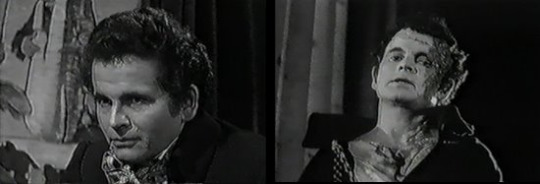
Before Benedict Cumberbatch in theater, there was Sir Ian Holm portraying both Doctor Victor Frankenstein and his Creature in this televised 1968 adaptation of Mary Shelley’s famous gothic sci-fi novel. His portrayal of the two characters is one of the most closest to the book characterization’s to this day: Victor Frankenstein as an ambitious and self-absorved student, and the Creature as a person who tries to be good, but due to abandonment and discrimination suffered due to his phisical appearance, becomes corrupted with an obsession for revenge against his creator. And Sir Ian puts those foil personalities marvellously.
LENNY (THE HOMECOMING, 1973)
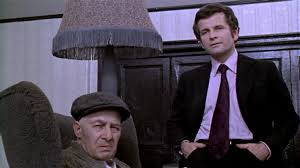
The Homecoming is a 1973 British-American drama film directed by Peter Hall based on the play of the same name by Harold Pinter.
In a dreary North London flat, the site of perpetual psychological warfare, a philosophy professor , Teddy, visits his family after a nine-year absence, and introduces his father, Max, his uncle, Sam, and two brothers, Lenny and Joey, to his wife Ruth.
Sir Ian Holm plays Lenny, a pimp who only makes discreet references to his "occupation" and his clientele and flats in the city (London). He is the character with the most cynical lines and who start the sexual tension between the man of the family with Ruth, not carrying at all if she is married to his brother Teddy.
There’s a character that anyone will love to hate.
PHILLIPE D'ARNOT (GREYSTOKE: THE LEGEND OF TARZAN, LORD OF THE APES, 1984)
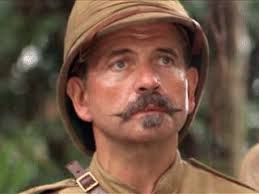
A Belgian explorer who discovered Tarzan (John Clayton) in the jungle, taught him the way of man, and brought him to his family in England. Is Phillipe’s friendship with Tarzan and their eventual departure that becomes the emotional core of the picture.
LEWIS CARROLL (DREAMCHILD, 1985)
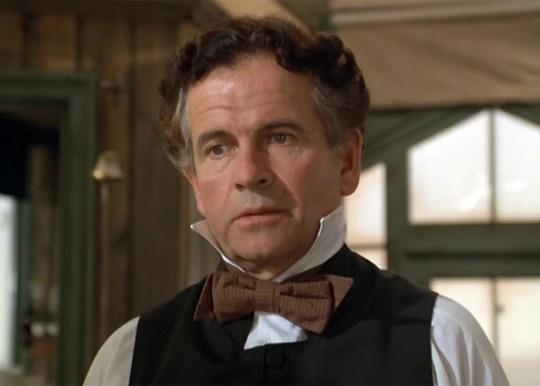
“Dreamchild” is a film written by screenwriter and playwright Dennis Potter. It was actually effectively a remake of an earlier project of his: the 1960s TV Play “Alice,” which had starred George Baker as Charles Dodgson, a.k.a Lewis Carroll – the man behind the “Alice” stories. But while “Alice” had been focused on Dodgson himself and his experiences with Alice Liddell (the little girl who inspired him to write the stories) and her family, “Dreamchild” takes a different approach. The 1985 film focuses instead on an elderly Alice Hargreaves (nee Liddell), who visits America to celebrate Dodgson’s centenary. During her stay, she has various nightmares, flashbacks, and hallucinations. Some of these have her seeing characters from the books, such as the Mock Turtle, the Mad Hatter, and the Caterpillar. Others are reflections on her childhood and the time she knew Lewis Carroll. Holm plays Carroll in these sequences, and the film plays with several myths and rumors about his relationship with Alice and her family…but it does so in a very clever way. Unlike the earlier TV play, which seems to treat these rumors and myths as fact, “Dreamchild” is far more ambiguous: nothing is confirmed or denied. It’s simply presented, and the audience is left to decide what is true, what is false, and how much it all really matters in the end. Holm brilliantly handles this ambiguity: in another actor’s hands, the character could have been perceived as thoroughly unsavory, but there’s such a gentleness, kindness, and overall innocence to Holm’s work that you can never really feel frightened or bothered. You feel for the man, no matter his flaws, and it makes his story just as compelling as Alice’s own.
RICHARD III (THE WARS OF THE ROSES, 1965)
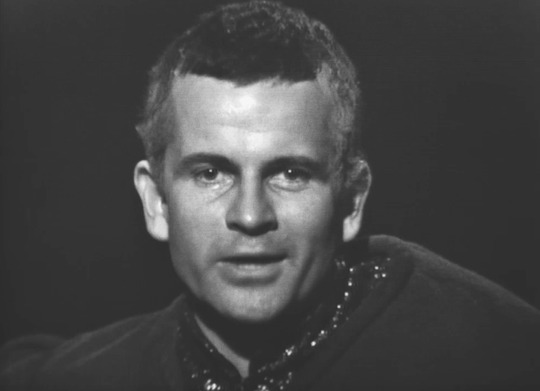
The Wars of the Roses was a 1963 theatrical adaptation of William Shakespeare's first historical tetralogy (1 Henry VI, 2 Henry VI, 3 Henry VI and Richard III), which deals with the conflict between the House of Lancaster and the House of York over the throne of England, a conflict known as the Wars of the Roses. The plays were adapted by John Barton, and directed by Barton himself and Peter Hall at the Royal Shakespeare Theatre. The plays were adapted by John Barton, and directed by Barton himself and Peter Hall at the Royal Shakespeare Theatre. The production starred David Warner as Henry VI, Peggy Ashcroft as Margaret of Anjou, Donald Sinden as the Duke of York, Paul Hardwick as the Duke of Gloucester, Janet Suzman as Joan la Pucelle, Brewster Mason as the Earl of Warwick, Roy Dotrice as Edward IV, Susan Engel as Queen Elizabeth and Ian Holm as Richard III.The plays were heavily politicised, with Barton and Hall allowing numerous contemporaneous events of the early 1960s to inform their adaptation. The production was a huge critical and commercial success, and is generally regarded as revitalizing the reputation of the Henry VI plays in the modern theatre. Many critics feel The Wars of the Roses set a standard for future productions of the tetralogy which has yet to be surpassed. In 1965, the BBC adapted the plays for television. The broadcast was so successful that they were shown again, in a differently edited form, in 1966.
In this production, the major theme is how the dispute for the crown of king is an endless cycle of violence that traps people, and this theme is highlighted in Sir Ian Holm’s performance as Richard III. His portrayal is more humanized and tragic, showing he was first a loving son and brother, until the vision of his father’s death in battle and the mistakes that his older brother, Edward IV, makes at the start of his reign, motivates him to become king, no mather if it is even at the cost of his relatives lifes. At first, Richard looks like he is in control of the situation, but later, as the final battle comes close, frightened by the ghost of the people he killed, he has to confront the harsh truth: Richard is only another pawn in the game of chest of a bloody History. Just like every other king that camed before him.
PUCK (A MIDSUMMER NIGHT’S DREAM, 1968)
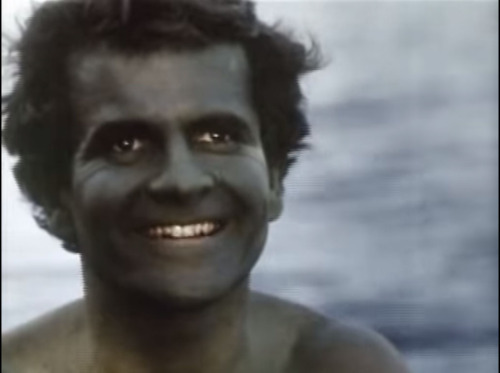
Sir Ian Holm played the character of Puck, a.k.a Robin Goodfellow, in a 1968 feature film adaptation of the play. The feature was poorly received at the time, but has gained a bit more of a following in recent years, particularly from avid Shakespeareans. Its chiefest pro is probably the casting of Holm in the role of Puck: he’s quick-witted, curious, and just a little baudy, but with a sharp and slightly dangerous intensity to him. You’re never quite sure what to make of Puck, and that makes him interesting, as he leaps from scene to scene, spreading chaos everywhere he turns.
FRODO AND BILBO BAGGINS (THE LORD OF THE RINGS, 1981 AND 2001-03)
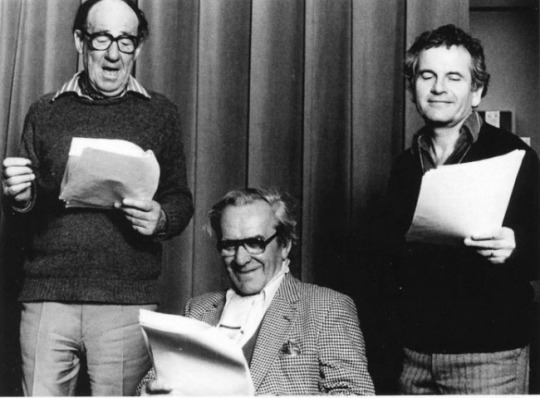
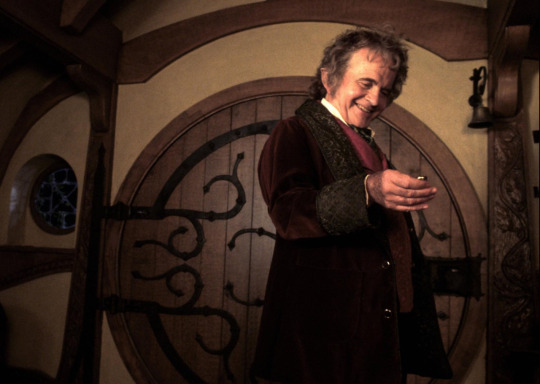
The most famous nephew and uncle in literature. He played the nephew in the radio in 1981, and the uncle in the feature films between 2001-03.
A lot of people were introduced to Sir Ian Holm’s work and becamed Lord of the Rings after being introduced to those performances.
In both roles, he was merry, he was funny, he was frightened, he was scary, he was brave and determined, he was sad. And all of us, listeners and viewers, related to those feelings transmited by his performances as Frodo and Bilbo.
Everyone has talked a lot about those performances, and everyone will probably will still be talking about them in the future.
#ian holm#sir ian holm#the wars of the roses 1965#a midsummer night's dream#the homecoming#the borrowers#dreamchild#bbc radio the lord of the rings#the lord of the rings 1981#greystoke the legend of tarzan lord of the apes#uncle vanya#moonlight on the highway#henry v#frankenstein#alien
18 notes
·
View notes
Text
the best thing is you
just jake, amy, and their favourite things about being parents
There are a lot of things Jake loves about being a dad: stealing his kid’s food when he can’t finish his plate, sleepy cuddles before bed, putting on voices for all the characters in his books, and wearing matching Adidas Superstars. But if he had to pick his absolute favorite number one thing, playing with Sam’s toys would come out on top.
Luckily, their apartment is filled with toys, organised by type, colour and size into various bins and baskets and labelled (Santiago Style!) so he always knows where to put stuff during tidy-up time. If Jake so much as accidentally puts one red Lego block in the yellow Lego container, Sam tuts, rolls his eyes and snitches on him to Amy later.
He has lots of toys but it’s not like he’s spoiled or anything; Amy has a big family and he gets a lot of hand-me-downs. Amy helps him write thank you cards every time he receives a new toy, they constantly remind him how lucky he is and donate his unwanted items to less lucky girls and boys.
(During one decluttering sesh, he puts his favourite truck in the giveaway pile for another kid to play with and Amy almost cries. They’re biased, but they’re pretty sure that Sam is the best kid ever).
They re-enact Ninja Turtles scenes with his action figures, roam the apartment with his dinosaurs and play shop (which consists of Sam selling Jake tinned goods that he already owns).
Both Jake and Sam’s favorite thing to play is the appropriately titled Detective Daddy game.
In short, Jake wears his badge and a tie (even over his t-shirts because, as he explains in his Grandpa Holt voice that never fails to make Sam fall over in a fit of giggles, wearing a necktie in the workplace is very important) and interrogates the three year old until he confesses to his crimes.
It usually goes like this.
“Princess Mommy has been kidnapped!”
Dramatic gasp.
“And I think you took her.”
“Me?” He clutches his chest, feigning innocence.
“I found her tiara in your bedroom, I checked the baby monitor security footage and you weren’t where you said you were and most incriminating of all, I found your fingerprints on her Amy water bottle.”
“My name’s Amy!”
(He often confuses the fact that they share one of the same names and thinks his name is Amy, not Santiago. It’s kind of adorable).
“I checked your file,” he brandishes a manila folder he stole from work and drops it on the dining room table, “and your name is Samuel.”
He gasps again. “I didn’t do it, Officer!”
“Just admit it,” Jake growls playfully, leaning forward to intimidate the suspect.
Sam climbs onto the table and closes the gap all the way, booping his nose against Jake’s and making him break character for half a second.
“Admit you kidnapped Princess Mommy,” Jake insists, tickling him until he finally surrenders.
“I did it! I did it!” He cries. “I kidnapped Princess Mommy and Queen Karen!”
Cue Jake a dramatic gasp from Jake this time.
“You’re going to jail for a long, long, long, long, long, long time!”
Jail is a pillow fort in the corner of the room.
(It’s actually cosy and super comfortable; Sam sent Jake there one time when he played the role of detective the morning after Jake had worked a night shift and he may have fallen asleep until his son decided to jump on him to wake him up so they could have more fun).
Jake scoops the dangerous(-ly cute) criminal into his arms and throws him in pillow fort prison, then rescues his Princess and Queen from the couch.
Sam can’t get enough of cop related games. It warms both Jake and Amy’s hearts that he’s so proud of what they do; it makes all the late nights and time away from him totally worth it.
Victor and Camila buy him a Police Station Lego set for Christmas and, after constructing it with mommy and daddy, it sits pride of place on top of his dresser next to a framed picture of the three of them. The next time he visits the Ninety-Ninth precinct he brags to Rosa, Charles and all the uniformed officers about how his police station is way cooler than theirs.
That very Christmas, he plays cops and robbers for the first time and kicks Santiago cousin butt. Amy high fives him in front of her brothers, thrilled that Sam is continuing her legacy of being the best at the game.
Jake will come up with elaborate (kid friendly) cases that Sam is obsessed with, for example, “oh no! Someone stole a pizza from Sal’s and is getting away!”
“Not Sal’s!” Sam cries because even at three years old, he is aware that Sal’s is the best pizza place in Brooklyn. Like father, like son.
He chases his police cars around the living room, making siren noises and eventually cutting the bad guy’s car off before he can escape towards the bedrooms down the hall.
(They’re going out for a walk when their elderly neighbour offers him one of her grandson’s fire engines that he’s got too old for. Sam declines because firefighters are for losers and the FDNY suck. Amy shoots her an embarrassed smile and herds Sam away).
When it’s time for bed and all the toys have been put away, Jake tells him the story of how a cool, leather jacket-wearing detective married the youngest female Sergeant in the history of the Nine-Nine.
Sam asks to hear it again every night.
--
There are a lot of things Amy loves about being a mom: baking chocolate muffins and pretending not to see when he steals some of raw mixture (even though he has chocolate all round his mouth), sleepy cuddles before bed, singing to Disney hits at the tops of their voices and trying not to cry when he brags about his mom being the youngest female Sergeant in the history of the Nine-Nine to everyone they meet. But if she had to pick her absolute favourite number one thing, teaching Sam to read and write and count would come out on top.
She was always good at school. She got the highest grades. She loved crawling into her dad’s lap and reading to him, glowing under his constant praise. She didn’t need any help with the big words unlike Tony and it wasn’t long before her teacher advised that she skip fourth grade.
She studied Art History at college, topped her class, and was the best in her group of recruits at the Academy, too.
As her brothers started having kids, she loved helping them read and, as they got older, helping them with homework. She especially loved when they would confide in her that she’s smarter than their dads. Beating her brothers, even as an adult, was still her greatest joy. Until she fell in love and had a kid of her own and beating her brothers was demoted to third spot.
The Santiago genes are just as strong in Sam.
He’s like Jake in a lot of ways: his dark, unruly curls, his nose, his sense of humour, his penchant for dramatic reveals.
(Running into their room at 5am shouting, “Mommy! Daddy! I didn’t wet the bed last night!”, for example).
But he is smart. Santiago-level smart.
He learns to count to twenty before all his friends, is a super reader and bilingual.
Amy has been singing him Spanish lullabies since he was a newborn, teaching him his “Por favor”s and “Gracias”s, whispering “Te amo” as she kisses him goodnight. She cries so hard the first time he says it back.
It’s very important to her that he can speak Spanish so they have lessons with daddy on Tuesday nights. She buys a textbook and makes them sit opposite her at the dining room table like they’re actually in school.
“¿Cuántos años tienes?” She asks him after their first lesson.
“Tengo tres años,” he responds with a proud smile that has Amy gathering him into her arms and smothering him with kisses.
Rosa has been teaching Jake Spanish for a couple of years but his brain is so full of case details and Die Hard quotes that Sam quickly surpasses him, joining Amy on her side of the table.
“Tell mama she’s pretty,” he instructs.
He furrows his brow, immediately looking to Amy for help.
“Luces bien.”
“That was it!” He snaps his fingers. “Luces bien, Ames.”
She blushes, tucks her hair behind both her ears and flicks to the next page of the textbook. She’s only in one of his hoodies and leggings, she’s not even sure when she last washed her hair, but her husband makes her feel beautiful. Always has done, right back to the time he said her dress makes her look like a mermaid.
Along with Spanish, she teaches him basic geography. He knows that Cuba is the largest island in the Caribbean, that Havana is the capital city and can draw the flag with his crayons. He shows off to Camila the next time they visit and earns himself an extra cookie.
He can write his name, too, and she remarks that at age three his penmanship is already better than Jake’s.
(Jake sticks his tongue out at her, even if it’s true).
Like Amy, he loves books. Loves the silly voices Jake makes as he reads, loves reading along with Amy and love love loves reading the book of Jake and Amy (illustrated by Terry) that Jake has made for his fourth birthday.
“Don’t you want to read a different book tonight?” She questions foolishly. They’ve read it three nights in a row.
“Nope,” he grins. “Mommy and daddy’s book.”
Her heart melts as she opens the book and he snuggles into his arms.
“It was her first day at the Nine-Nine...”
--
After an interrogation that went on longer than expected, Jake missed dinner and bath time and had to break several speed limits to get home in time for his bedtime story and goodnight kisses.
He locks the apartment door behind him and follows the sound of Amy’s voice to Sam’s bedroom, recognizing the story immediately.
“I’m hearing wedding bells!” Amy reads, doing a spot on impression of Charles’ voice.
Jake stifles a laugh, leaning against the doorframe and listening to his wife recite the story he knows so well.
There are a lot of things they love about being parents, but at the end of the day, watching Sam play and learn and cuddle their spouse is the best thing of all. And soon they will get to watch them do it all over again with Baby Peralta 2: Peralta Harder.
#b99 fic#jake x amy#my writing#if anyone wants to doodle that kids book....... I would love you FOREVER
126 notes
·
View notes
Text
DC’s Stargirl soars high and shines bright! (Spoilers.)
I logged into my DC Universe account last Monday totally ready to my hopes surpassed by the service’s newest original program Stargirl after I was pleasantly surprised by the complete balls to walls delightful wackiness of the Harley Quinn Animated Series. Now, I confidently say that DC Universe has hit another home run with Stargirl’s pilot episode, and I’d like to explain why. To say that I was simply interested in Stargirl by the end of the pilot is a vast understatement. No, I was completely captivated by the show’s superhero world and sophisticated action by the time the pre-credits sequence was over, I couldn’t to see what else the show had in store throughout the episode, to the point where I was actually sad that I had to wait a week when the end credits rolled.
The pilot begins ten years ago on Christmas Eve with Luke Wilson’s Pat Dugan racing down a Los Angeles street in a retro red and white Chrysler as his superhero partner Starman/Sylvester Pemberton fights alongside the Justice Society of America battles against the evil Injustice Society of America led by the villain Brainwave in a knock down drag out fight for the ages,which the JSA is desperately losing. Unfortunately Pat arrives too late with Sandman, the Golden Age Flash, Dr. Mid-Nite, Wildcat, and Hourman dead or currently dying, meaning Pat has no time to worry about the rest JSA as he searches the battle site for Joel McHale’s Starman, who’s busy kicking the ISA’s asses with his Cosmic Staff, but Pat’s presence at the battle causes Starman to become distracted and be fatally wounded before Pat is able to drag to him to safety in his car, which is capable of more than meets the eye, because it can fly for a hot second until Solemen Grundy forces it down. The night ends with Pat’s car totaled and Starman dying in Pat’s arms, but not before telling his soon to be former sidekick that the JSA’s legacy must live on, and someone with honor, strength, grace, and heroism must carry the Cosmic Staff.
Elsewhere in LA, a young five year old named Courtney Whitmore waits to give a Christmas present to what later will be confirmed as her absent father by Courtney’s mother Barbra played by Amy Smart, as the present remains unopened even up to the present day ten years later when Courtney and her mom are about to move cross country to Blue Valley, Nebraska with Barbra’s new husband Pat Dugan and his son Mike played by Trae Romano. Courtney mopes about missing her friends in LA and pretty much ignores her family in the process, especially Pat’s attempts to bond, until lunch time of her first day at Blue Valley High School when Courtney sits with a table of outcasts right before the school’s meathead jock Henry King Jr. begins slut shaming a girl who will become the new Wildcat alongside his band other meatheads, they even go so far as to steal the girl’s phone until Courtney steps for her and pushes Henry into a juice tray, an act that lands Courtney in detention on her first day, which isn’t a bad thing when you do it for the right reasons. and it’s shows Courtney as being someone with strength and heroism to stand up for others like Starman said,
Long Summary kinda short, Courtney continues to mope about the move and be frustrated with Pat’s attempts to be fatherly to the point where she takes her frustration on a box of Pat’s stuff in the basement, where she discovers box of his old JSA stuff, including files on the ISA a picture of the entire JSA team as well as Starman’s costume, which causes the Cosmic Staff to become sentient to Courtney’s command, leading her and the Staff to teach the meatheads by kicking their asses and blowing up their ride home after the group is bullying some other kids at the town drive-in. Pat is able to catch Courtney and the Staff in the act as they return home through the basement window, which brings me to my favorite parts of the episode as Courtney and Pat confront one another about the secrets they hiding, and the two are finally able to bond over the lameness of Pat’s code name Stripesy, I do hope their bond continues growing in future episodes
The action-packed episode doesn’t end there, because Henry confesses that the car was blown up by a masked person with a glowing staff, catching the attention of Henry's father who just so happens to be Brainwave, still alive and even aniger. Another thing that I love about the first episode is the relationship between Courtney and Stafie, as I'm calling it, Stafie clearly adores Courtney and follows her around like a little puppy who is ready to take her on superhero adventures, even if that over excitement leads them directly to Brainwave before he easily trounces the girl with mastery of his telekinesis powers against the relative inexperienced Courtney, who struggles to get away from the villain, until Pat comes to her aid while sporting a gigantic robot mech suit in a cliffhanger to end the episode.
Now that the overly long summary is finished, I'd like to give some positives and negatives that I haven't mentioned yet. First, the positives.
Geoff Johns: It's clear that getting Stargirl on the air was a passion project for the character's co creator, Geoff Johns, who based Courtney off of his own sister of the same name after she tragically passed away in an airplane accident. Johns also has an affinity for the JSA, I mean, it's pretty obvious since he had notable runs writing about Stargirl and JSA, but that love doesn't hinder his ability to write a gripping episode of TV that pays respect to the past comic books with clever easter eggs, yet tells a new origin story for Stargirl than the one seen in the comic books, which is friendly to those unfamiliar with the character. Plus, some of the jokes in the script got an honest chuckle out of me, like Michael Dugan asking what sports team Gerald Ford played for and Pat's response.
Brec Bassinger as Stargirl: I was pretty unsure how to feel when DC Universe cast a relative unknown actress as the lead of one their shows. If you asked me what my reaction to the casting news was, I'd say that I was cautiously optimistic and wanting to see more, as it turns out, I wouldn't have to wait long for a first look, because Stargirl and The JSA had cameos at end of Crisis on Infinite Earths. Now that the show has premiered, I have nothing but positive things to say about Bassinger's performance of Courtney, she plays the character with an understated confidence which she grows into as the episode continues, and she also plays the role with a great deal of physicality and physical reactions to things happening around her, such as the reaction Courtney has in school ID photo, as well as the reactions she has when Stafie tries to drag her along for the first time. It will be interesting to see how the character will evolve over the first season.
The production and the world building: Maybe it's because the show is co production between DC Universe and the CW Network, but the budget has put to good use by the production team, I mean, they built an actual S.T.R.I.P.E robot for use in certain shots, the show should be commended for that alone. The costume design and special effects are all top notch, as usual in any superhero show nowadays, but I want to bring special attention to spectacular background details used in things like ISA's criminal files, the photos of the JSA, and the photo between Starman and Stripesy, pretty much everything in Pat's box of JSA memories gets a nerdy chief's kiss from me.
Luke Wilson as Pat Dugan: To put it simply, I can describe the way Wilson plays Pat Dugan as a good dad who rolls with the punches life throws at him and tries to do the best thing in every situation to keep his family safe, even when he's overwhelmed, but he doesn't let that fact dampen his positive and charming attitude. Honestly, I'm rooting for him to succeed as much as I am for Courtney.
Now, the negatives.
The New JSA: I wish the kids who will eventually become the new generation of JSA had more to do in the two episodes of Stargirl released so far, or at least had their characters set up. Only the new Dr. Mid-Nite played by Anjelika Washington has a small handful speaking lines over the two episodes and any character establishment as a girl named Beth Chapel, who is in need of friends so much that she talks with her parents over video chat at lunch instead of the other kids, while the new Hourman played Cameron Gilman only has one line before leaving the scene to probably get in trouble because he's in detention in the following scene, so I guess he's the bad boy/powerhouse of the team. The same one line treatment wasn't given to the new Wildcat played by Yvette Monreal, who must sit in shy silence as the meatheads bully her until Courtney steps to her defense. I know the new JSA members will become more confident and open up emotionally once they adopt their superhero personas, but I would've liked a hint of the heroes that the kids would become during these two episodes, or at least have the new Wildcat work up the courage to thank Courtney for what she did for her.
Travis: One of kids in Henry King Jr.'s band of meatheads has the audacity to besmirch the good name Travis with his repulsive douchey behavior, putting other people who just happen to have the same name to complete shame, but I want to tell you that not all people named travis are the alike.
For the last section of the post, I'd like to ask some questions brought to my mind after watching the first two episodes of Stargirl, which I hope will be answered in the remainder of the first season.
Is Sylvester Pemberton truly Courtney's Biological father? Sylvester seems like an obvious red herring, but I wouldn't be surprised if the show decided to change Courtney's Bio Dad from who he is in the comics, they changed Courtney's sport of choice from cheerleading to gymnastics.
If Sylvester isn't Courtney's Bio Dad, and Pat said the Cosmic Staff only worked for Starman, then why does it also work for her?
What's up with the janitor of Blue Valley High? Something's up with that bearded janitor who gave Courtney weird looks during her first day of school, like he knows more than he's letting on, maybe he's an old JSA member. My guess is he's Doctor Fate because he wasn't one of the confirmed dead on the night the original JSA team perished, I think he used his magical powers to peer into the future on that night and saw what Courtney and the new JSA would become, so Janitor Fate planted himself in Blue Valley to watch over them. Either that, or he's just a crazy man
Does Rick Tyler know what his father did with the JSA? In the second episode, it's revealed that the original Hourman, Rex Tyler also survived fight against the ISA, at least long enough for him and his family to follow the villains to Blue Valley before he and his wife are killed in a car accident, so does Rick have a clue about his father's superhero life, or was it hidden from him like Pat tried to do with Courtney? Does Rick become the new Hourman to get revenge for/honor his father?
What else could Pat be doing in Blue Valley? Is he following in Rex's footsteps and completing his mission to stop the ISA, or it just a fresh start for his family?
How will the different members of the new JSA assume they're superhero roles, and how they help Stargirl stop the ISA?
How does "The American Dream" initiative to help Blue Valley prosper factor into the ISA evil plans?
Do the ISA's children factor into their parents' plan as well?
Will the new Wildcat finally get to speak in episode three?
Suffice to say, I love the new Stargirl TV series quite a bit, it has quickly become my favorite thing DC is producing right now and it's even gotten me interested in the comic books Stargirl is based on, which I believe is the job of any adaptation from page to screen after delivering a compelling story and characters.
Thanks for your time.
#stargirl#courtney whitmore#brec bassinger#dc stargirl#pat dugan#luke wilson#dr. mid nite#anjelika washington#hourman#rick tyler#cameron gellman#Wildcat#yvette monreal#starman#sylvester pemberton#joel mchale#barbara whitmore#amy smart#mike Dugan#trae romano#justice society of america#JSA#injustice society of America#dc universe#dc comics#geoff johns#harley quinn animated show
26 notes
·
View notes
Text
Deadly Fortune, Book 2, Chapters 16-20
Last bit of notes! Everything under the cut to avoid flooding all the dashboards. I want to say that while I found some of the translators lines amusing or hard for me to understand, they deserve a heck of a lot of credit! I wouldn’t have been able to read this AT ALL if not for their super hard work. It’s a really tough job, and my dumb, monolingual self really appreciates it.
Link to the translation: https://originaldmc.github.io/DivinityStatue/Downloads.html
Link to the previous section of notes: https://madartiste.tumblr.com/post/186847616290/deadly-fortune-book-2-chapter-00-1-15
Stage 16 (Dante vs. Berial)
Berial is salty about losing to a 'man who is not as tall as his calf,' so he comes back to the human world before he's fully recovered. He's annoyed that Nero isn't there and wonders just what the kid is. He's definitely not a full demon or Berial would know him. Initially he thinks that Nero is a 'personal class.' (Not sure what that means, not enough context) Or is Nero the child of a human and a demon? He considers that someone like that would be extremely rare. He wonders how Sparda could fall in love with something as small and weak as a human and have children with one. Pretty much all demons think the idea is super gross.
2000 years ago, Berial was still a wee, weak demon, but he heard about Sparda. Mundus was able to rule in part thanks to his right hand man (er… demon), Sparda. Berial wanted to be like him someday (oooh, so he's so grumpy because he idolized the guy.), but Sparda turned traitor and killed many of his comrades before sealing away Mundus. It's incomprehensible to Berial, and he thinks that no other demon would ever have kids with a human.
He's heard about Dante and wonders if Nero is another son of Sparda. (Good guess, buddy.) Dante looks a lot like Sparda's 'human mimicry,' though he thinks that Dante might have surpassed his father's strength at this point.
Berial thinks the Savior is stupid and even he feels that Sparda didn't save humans so they could make something so dumb.
He recognizes Dante instantly which thrills Dante. He's happy someone knows who he is. Interesting bit: Berial heard that Sparda was cold and quiet, not one to talk too much -- so like Vergil.
Haha! Dante says he's in a hurry, but Berial wonders why he would waste time sitting on his damn tail if he thought things were urgent.
Berial waits patiently while Dante grabs Lucifer. Apparently Berial was just a low-level demon and therefore never met Mundus. These days, he's a General and a King, so he would be able to -- except that Mundus is sealed away. He recognizes Lucifer too. Dante asks if they were friends, most Devil Arms are crafted by demons but some are made from demons who recognize the strength of an opponent. (That's pretty much every weapon Dante picks up in the games.) It's a bit conflicting, but Berial says that 'the body or the soul' of a demon acknowledges they have lost and, regardless of their will, they become a Devil Arm.
Lucifer was also a king/ruler in hell and a 'noble demon.' He had the power to manipulate explosions.
Berial gets annoyed that Dante is playing with him during the fight. I'm… pretty sure most of Dante's dialogue here is innuendo (just like in his game scene after he gets Lucifer back. Pretty much the same words.). Berial has no idea what he's on about.
Dante offers to let Berial run, but of course he doesn't. Aaah, he doesn't want to turn into a Devil Arm for Dante. Berial almost gives in to becoming a Devil Arm anyway, but resists at the last second, feeling sorry that he couldn't avenge Lucifer.
Dante still has to get the Sparda and Yamato back. He's not sure what happened to Nero, though if he's lost his body, Dante knows he can't save him. Interestingly, Dante thinks that as long as he can get Yamato back, he's got a chance since it can 'separate the people from the devil.' Even if Nero is absorbed, Dante might be able to use Yamato to get him free. (And thus we get the major plot twist of DMC5!)
He wonders if it is fate that he came to Fortuna and met Nero, though he doesn't like the idea. Dante doesn't want to delve into who Nero's biological parents actually are, though he knows he's got a close blood tie to the kid. According to Dante, his aging is pretty close to a normal humans. Dante has no idea what happened to Sparda, if he's dead or alive, and claims that it doesn't matter to him. There's a nice line about how he might entrust the future to Nero the way Sparda did with Dante and Vergil.
And then Dante decides he's being weird and will worry about it later.
Stage 17 (Dante vs. Agnus)
Agnus was waiting in the Opera House because he wants to defeat Dante 'with his own strength.' It sounds like his particular devil ability is to absorb 'magic' power from other demons? With the Hell Gate open he's got a lot to grab from. Oh right. Agnus has that health drain ability. He plans to suck the 'magic' out of Dante to make himself stronger and Dante weaker. Agnus put a ward on the Opera House, but he deliberately breaks it so Dante can get in -- even though he acknowledges Dante could just bust through.
The scene is pretty close to the game scene with Agnus, though Dante is pretty confused at first. Ah, Dante figures that Agnus gave him a 'role' in the show, so he plays along. He thinks it's rather fun. He even plays around with the spotlight system to be dramatic. Hm. Agnus is annoyed that Dante butted into his performance. He refers to himself as an 'archangel.'
Dante doesn't ask, but Agnus likes to tell him how he made the artificial demons he summons to fight for him. Dante gets pretty roughed up, and Agnus gloats about how strong he is. Ah, Dante goes Royal Guard on him. It works by hardening parts of the body -- maybe with his devil powers? Agnus gets really wound up by the fact that Dante deflects all his attacks.
Dante thinks that Agnus is too excitable to be a really good scientist. He knocks him down with a Royal Release. Since Agnus isn't out of the fight completely, Dante finally uses his Devil Trigger. (Good bye, Agnus.) Agnus is terrified, and Dante stabs him through the chest. Agnus turns back to human since his energy is used up. He dies just like in the game.
Dante thinks the whole thing is a tragedy, that Agnus went so far off the deep end with his science. If he hadn't, Agnus' life might've turned out differently. In the end, Dante shoots out the spotlight.
There is an interesting line as Dante wonders if Agnus might understand what he was getting at when he says that humans have something demon's lack: 'It's only one word, but it's more precious than anything, so it's cheaper to use language.' The language is a little weird here, but I think the gist is that if you can't figure it out on your own, you'll never understand. (I'm assuming the word is 'love' considering Nero's dialogue with Sanctus at the end of the game.)
Stage 18 (Dante vs. the Savior)
The citizens are panicking and don't care who Trish is as long as she's guiding them to safety. She takes them to the 'Calound Pier' which is a good ways from the city. Oooh, it's the port warehouse from the game, I think. Trish swiped a 'magic device' from the Order and uses it to create a protective barrier around the warehouse. She doesn't naturally have the ability to do such a thing on her own. After doing that, she runs back to the city to the Hell Gate.
The gate is still working at this point which worries her. She doesn't think that Dante lost -- but she knows he has a 'sloppy personality.' (Hah!) She frets that he might have gotten lost, wasted time playing around, or something like that. As his partner, she knows he is capable of that kind of thing, but she also knows he can be series when things are bad. There's another line about how Dante doesn't like to do what people expect him to.
Trish finds Dante at the city square. She sees him with Yamato and thinks about Vergil. She never understood him, but then again, she never knew the Vergil that Dante did since he was a mindless puppet when she met him, 'he had no personality or soul.' Dante swings Yamato around with such precision that Trish wonders if he learned it from watching his brother. She thinks that Vergil lives on in Dante's heart -- even if Dante doesn't know it.
Dante shows off for her -- pointing at the Hell Gate after he cuts it and not watching it fall. Trish thinks she understands why Sparda didn't destroy the thing when he was here. Sparda was a demon and therefore the Underworld was his home. He might have been kinda homesick and not willing to cut off the last route there. Trish feels the same way, which is why she studies information about demons and Devil Arms. Dante probably wouldn't understand the feeling since he was born in the human world.
The Savior sees the Hell Gate go down and heads in their direction. Dante and Trish talk about trying to keep the fight away from where the citizens are holed up. Trish suggests taking them out to Mitis Forest since there are still a lot of demons in the area and trying to fight them while protecting everyone will be hard even for Trish. Also the Savior is huge and they're not sure the port is far enough away to be safe. She's got some plans to protect everyone from the demons in the forest.
Turns out Lady is her plan. As long as Lady arrives safely, of course.
Dante quips with Sanctus who is possessing one of the Alto Angelos. (Pretty much like the game.) He runs along the rubble avoiding the Savior's attacks. (Also like the game) Dante is very concerned about saving Nero before he takes out the big statue. His first thought is that Nero might be inside the blue gems on the Savior since they're giving off a lot of magical energy. He decides to break a few of them first to see what happens.
He's using Pandora for a lot of this fight and Omens a bunch of the Angelos that are chasing him around. Then I think he Judgement Cuts the Savior?
Back to Nero: He regains consciousness and starts remembering who he is. There's a line about a 'part' of him or a 'fragment' of himself that he feels nearby helping him remember. It's Yamato. He says he can feel Dante nearby with a 'part of me in the hands of Dante.' He feels lousy because Dante has to come rescue him. He says he's lost his body but definitely doesn't want to just lay around doing nothing. Nero wants to save Kyrie with his own strength. He tries to scream but can't.
Back to Dante: Outside, there's a fluctuation in the Savior which Dante thinks might be Nero. He contemplates the gem on the chest and hears the 'cry of the soul' 'of the same bloodline as himself.' So he stabs the Savior in the chest. He's a little nervous about the Savior's big beam attack. Normally he can tank demon attacks, but this one looks particularly strong. He Devil Triggers with the intention to, I think, fly out of the way? He sort of armors up instead and lets himself get hit with the attack. He isn't able to move, though his power keeps him from being hurt. Once it's over, Dante jumps back over onto where the left Rebellion sticking out of the statue.
Sanctus gloats. Dante gets Yamato inside the Savior (pretty much as per the game). I also think he calls Rebellion back to him? There's a line where he kinda motions at it with his finger and it flies back to his hand.
When Dante yells at him to wake up, Nero tries to yell back but can't. Dante thinks that their meeting was accidental, but that it would've been very boring otherwise. He yells Nero's name.
The first part of Nero that is restored is his Devil Bringer, which seems to annoy him somewhat since he hates it, and grabs Yamato. He mentions that something is tying him down and covering his body. He can think more clearly now that he has hold of Yamato. He gets himself loose and sits down for a second because his vision is fuzzy. Nero realizes he's still got to save Kyrie and assumes that the pope would keep her far away from him as insurance.
Dante tells him to go be the hero. Nero feels pretty confident that with Dante's backup he can go save his gal.
Stage 19 (Nero vs. Sanctus)
Lady POV: They're still on the boat. She basically tells Ben that she paid him so he'd better do his best. He says he would've refused if he knew this was a suicide run. He does what she tells him though. Trish is waiting for them on the dock.
Lady asks how things are. Trish tells her the sea breeze is bad for her hair. (Hah!) Lady says she'll help Trish cut her hair if she wants to try a shorter haircut, and thinks that she doesn't really understand Trish very well.
Trish gives her the situation: Citizens hiding in the warehouse, Dante fighting the big bad. Lady wants to know what the hell the Savior is. Is it a demon? Trish says it's the "product of stupid humanity." Taking a look around, Lady worries about the property damage. Trish asks for her help taking the citizens out to the forest, but they get surrounded by demons while they're talking. Time to fight. Lady thinks that Trish's lightning is pretty convenient and is a bit envious of her and Dante's powers. Since she can't do stuff like that, she needs money to fund her ridiculous arsenal of weapons -- which is why she's so stingy with her money and charges high fees.
Demons are damaged by silver more than iron.
Back to Dante: He's saved Nero, so he's mostly done with his part. Now he's just playing around. Without Nero powering it, the Savior can't fly and has reduced mobility. Dante knocks the thing around with Gilgamesh, breaking the bottom of one of its feet. Nero bitches at him for shaking things around.
Dante says "This is fun" and stabs the Savior in the eye with Rebellion.
Back to Nero: The inside of the Savior is like a labyrinth full of demons. Nero wonders if they were being used to power the thing like he was. He's not sure how much time has passed -- he thinks probably only a few hours -- but it feels like years. He's lost Red Queen and Blue Rose, and he feels really rusty. Killing the demons he keeps running into helps him get back into fighting form. Nero isn't very comfortable fighting with Yamato yet, but he doesn't have a choice. He wonders why he thinks of the Yamato as part of himself.
Nero instinctively knows where to go and thinks it might be that he senses the power of the Sparda. He remembers Sanctus talking about meeting Vergil and isn't sure if he believes that was his father or not. He always thought he was human, but the way the Yamato feels and how it glows along with his Devil Bringer… He makes a comparison of himself being a caterpillar becoming a butterfly -- basically that he's becoming what he was meant to be. Nero jokes with himself that he's already lost his body once and had to remake it.
He gets to Sanctus and thinks that the guy looks way more like a demon than an angel. Sanctus pulls Kyrie out, and she is obviously frightened but can't speak. The pope threatens her, and Nero immediately can tell the sword is the Sparda because he feels a tremor in his hand. He notes that it's not because of 'fear or excitement.'
Sanctus sticks Kyrie back in the wall, which surprises Nero. He wonders if Sanctus doesn't want to use her as a shield because he wants to have a fair fight or if he's just overconfident. They start fighting.
While Sanctus does his trick where he hides in the Savior, Nero realizes he can easily sense the presence of the Sparda. Oddly, though it said earlier that Red Queen was lost, Nero pulls the sword here. I think this might be an error, though, since it also mentions that the Yamato is able to hurt Sanctus.
So Nero remembers that Sanctus was once the Supreme General of the Holy Knights, but he notes that the Sparda has used up a lot of its power. He straight up tells Sanctus that Credo was stronger than he is. Nero uses some of his training from Credo and stabs Sanctus, saying that this was revenge for Credo. He asks who should be next, maybe Tonio and Sagan. We get pretty much the same "Sparda had a heart that could love a human" speech from the game.
Sanctus decides to use Kyrie after all, but it goes down just like in the game.
Back to Dante: He's chopped up the Savior a bit, but the thing is tough and huge. He compares its appearance to a statue that was salvaged from the bottom of the sea. When Nero jumps out holding Kyrie, Dante thinks he looks like a prince rescuing a princess in a fairy tale.
Kyrie isn't too surprised by Dante or anything else, which means she might have had some awareness of what was going on while she was stuck in the Savior. Dante basically tells Nero that his gal is a keeper and he should be good to her.
When Sanctus merges with the Savior to control it at the end, he loses his human intelligence and becomes beast-like. After seeing Nero crush the Savior's head, Dante says that in terms of sheer strength, Nero might outmatch him. Nero does a shy little victory pose at the end, and Dante thinks he really is just a kid. He tells Nero that in a few years he might be a bit more fierce, which annoys Nero.
There's a line where Dante considers that even though they're closely related, their personalities are very different -- and he feels that's a good thing. He doesn't want Nero to be like him.
Dante tells Nero: "However, too serious or not, it is the key to live easily. Too much attachment will only be ruined by boring things, and the only thing that will hurt is his own." (If someone can figure this out, please let me know. My guess is: Don't be too attached to things or the only thing that you will hurt is yourself? Possibly he's saying not to be too series or it could hurt the people around him. I'm figuring this advice is to not be like Vergil.)
I really wish I could figure out what that is saying, because afterwards, Dante thinks that he can 'see the shadow of his brother Vergil' in Nero. They share a similar stubborn pursuit of strength. Dante then knows he has to 'part' with his twin.
Dante tells Nero to cherish the Yamato along with "your lovely girlfriend." He thinks that who Nero's father is doesn't really matter, and he doesn't have any definitive proof. (He sure sounded certain in DMC5…) The important thing is that Nero's 'soul is qualified to inherit the Yamato.'
Dante heads to the port to meet Trish and bumps into Lady. He wonders why she's there since she's the client. She tells him she's their ride home. Naturally all the fees for the ship are coming out of his pay.
Back to Nero: He still doesn't really want Kyrie to see his demon arm, but she's a sweetie and does her speech about him being himself no matter what, like in the game. He's actually a bit relieved that the demons interrupt their kiss because he's kinda worked up over everything.
Stage 20 (Aftermath)
One month later: Dante enjoyed the quiet for the first week, but now he's bored. He's read the same magazine four times already. Trish has been dropping by now and again. When Lady shows up with the payment, Dante doesn't get excited because he's sure she's stiffed him again. She ends up taking 70% of the fee for herself to pay for the boat fees, damages, and helping them fight demons at the docks. Trish is annoyed. Dante just doesn't care. When Trish protests, Lady mentions that, oh yeah, the reason things got out of hand was because Trish gave the Sparda to the Order -- so she takes more money out of the stack. Dante starts to sweat a bit because he's the one who told Lady that, and Trish obviously views it as a betrayal.
There's an odd line where Dante asks Lady about a job he wanted her to do, but she tells him she 'already sent it' and took the fee out of his cut. (Found out later that Dante was talking about the neon DMC sign he sent to Nero.)
So the 'customer with the password' thing is to make sure that only people with demon jobs are bothering Dante. The password circulates around the shadier areas, so presumably people with demon issues find out about it from other people in the know.
When they run off at the end to do the job, Lady asks to make it a bet: Whoever kills the most demons gets all the money from the Fortuna job. Dante thinks that it would be more fun if Nero were there, but he's got a hunch they'll meet again.
Back to Nero: He's contemplating that he was abandoned at the orphanage and no one, not even himself, knows who his parents are. He was given the name Nero by the 'dean' of the orphanage at the time who has since passed away. He was named after the black blanket he was wrapped up in. To Nero, this is pretty much like how you'd name a puppy or a kitten, though he doesn't really have strong feelings about his name. He thinks it sounds like an ancient saint, which suits him.
Nero thought a lot about why he was abandoned and who his parents were when he was little. He couldn't accept that he didn't have parents. People speculated that his mother was embarrassed to have a child. (I'm guessing the implication was that having a kid out of wedlock is frowned on.) Fortuna is a small city and everyone knows each other. It's impossible to give birth without people knowing, but there wasn't anyone in Fortuna who had when he was discovered. There's a mention about 'foreigners' coming to Fortuna at the time, presumably people thought one of his parents might be one. (I mean, not wrong.)
Nero would fight with people when they bullied him about it as a kid, but now he doesn't care who his biological parents are. Kyrie, Credo, and their parents were his family. He feels he can be content as long as he still has Kyrie around and can keep her safe.
They're renting a house as a home/office. She wants his help carrying some food. Kyrie has been cooking food for the people who've been displaced by the destruction. Some of them have been living out of the Opera House even. Nero calls her goddess and carries a big pot of soup for her.
He doesn't like going out since people are more likely to be nice to Kyrie than they are to accept him being around. Most of the townsfolk believed Kyrie when she told them that Sanctus went nuts and caused all the destruction, but some people think she's lying. The fanatics slander her and still believe in Sanctus. They also try to use the fact that Kyrie is dating a 'demon' against her.
Nero doesn't hide his hand anymore. He knows it doesn't prove he's related to Sparda, but he doesn't care about that anyway. He doesn't want to be worshipped. It's just a part of him, and he's not ashamed. To Nero, the Devil Bringer is why he could rescue Kyrie. Apparently some people think that because she's with him, Kyrie will get possessed by/turned into a demon too.
Kyrie tells Nero not to wear his coat because the weather is good outside. He's hesitant because it hides his arm. He doesn't care what people think about him, but he doesn't want people to speak poorly of her. She says she doesn't mind and that people will come to understand Nero eventually.
There's a kid named Abel from the orphanage Nero was raised in. He doesn't know who his parents are either. Abel tries to open the pot of soup but Nero gently swats his hand and then pinches the kids cheek with his Devil Bringer. Nero sends the kid to Sister Xista in the Opera House to have her prepare some dishes so people can eat, and whispers to Kyrie that the kid is arrogant.
She laughs at him and says Abel is just like he was as a kid. Nero says he was way more straightforward, and she points out that Abel isn't afraid of Nero's hand. Kyrie has been laughing more recently, possibly because she has let go of many of her burdens. It seems both Kyrie and Nero are actually comforted by the fact that Credo didn't leave a body behind. It lets them kind of pretend that maybe he's still alive -- though they both know that it's not true.
The people decided to use the site of the ruined Order of the Sword building (Maybe HQ?) as a cemetery for those who died. It's simple construction, but they play to make it nicer once they finish rebuilding. Things are getting better day by day.
Nero didn't used to think very highly of 'the city of Kyrie.' Thanks to the rigid customs, someone like him, an outsider, had a hard time living there, but Kyrie loves the city so he wants to protect it.
Kars comes by with a big wooden box for Nero who is very confused. The only name on the label is Dante. Kars thought it was some relief supplies. Ah! It's the neon Devil May Cry sign. Nero planned to open an office on Fortuna to hunt demons since the knights can't anymore, and apparently Dante foresaw it. Kyrie wonders why Dante hasn't contacted them since that day. Nero's a little annoyed that Dante decided to pick the name for his new business, but accepts it since it's a gift. It's a good name.
End of Book 2
11 notes
·
View notes
Text
Why Harvey Keitel’s Lansky Looks for Goodness in Bad Men
https://ift.tt/2U2hKkb
The biographical crime feature Lansky attempts to pull off a major heist: the historical legacy of the mob mastermind Meyer Lansky. One of the most notorious and infamous of the Jewish gangsters who rose during prohibition, Lansky was a businessman with a head for numbers. He was called “the Mob’s accountant,” and the film wants to set the record straight. Played by Harvey Keitel, we can count on an emotionally accurate portrayal of the man who helped set up the national crime syndicate.
John Magaro, who will be playing young Silvio Dante in the upcoming The Sopranos prequel, The Many Saints of Newark, plays young Meyer Lansky. Writer-director Eytan Rockaway’s crime drama is loosely based on the real-life story his father, Robert A. Rockaway, and the interviews he conducted before Lanksy died. His book was called But He Was Good to His Mother: The Lives and Crimes of Jewish Gangsters, and it included noteworthy figures like Waxey Gordon, Arthur “Dutch Schultz” Flegenheimer, Jack “Greasy Thumb” Guzlik and the Purple Gang out of Detroit.
Rockaway spoke with Den of Geek about those gangs and why Meyer Lansky’s life was the story which most needed to be told. He also explains why Lansky needed Harvey Keitel to tell it.
I appreciate the history behind Lansky, how much of your father’s encounter do you remember?
Eytan Rockaway: Well, I wasn’t born back then, but I did take his research and his transcripts and I interviewed my father at their meeting. The movie is mostly historically accurate, except for that part where my father was a down-on-his-luck reporter. And I did rely on his research and his transcripts, and he wrote a book about gangsters. Meyer Lansky was one of the dozens of big gangsters that he interviewed. I relied a lot actually on his feelings for Meyer Lanky just before he died when he was in his 80s.
The book was But He Was Good to His Mother. Which of the other Jewish mobsters in it do you think would be most cinematic?
I think Bugsy Siegel, but they covered him in that great movie. I think that the Purple Gang are an interesting group. I think that Murder, Inc. in general is a very, very interesting group because most of the people who started at the Bugs and Meyer gang then transferred to Murder, Inc., and then they brought the Italians.
But I think the people in Murder, Inc. are definitely some of the toughest and some of the most notorious killers. I mean, the FBI said they killed between 500 to 1,000 people. They were vicious killers. They’re not great guys, but I think it would be an interesting story. But there are so many. Dutch Schultz and Lepke Buchalter and all of them had interesting lives. But Meyer Lansky, by far, I think, surpassed not only them, but most gangsters in American history, just because of what he managed to achieve and accomplish.
I’ve read books on Lasky and I was actually surprised at the arc of Lansky’s son, Buddy.
Well, he loved his son Buddy. Lansky put a lot of love and effort in him and he was very close to him. I tried emphasizing that relationship specifically because I thought that it showed, even when he was in his ruthless years as a criminal and doing all these bad things, he still had a soft spot, especially for family and it still was the most important thing to him. And I think, the relationship with his son that had all these issues, health issues, that I emphasized that.
One of the things your father’s book points out is that the Jewish mobsters were only one generation of the children of immigrants. Why didn’t it continue in generations, the way the Italian mobs did?
It’s a cultural thing. I think that a lot of these Jewish gangsters, because they came to America and they were second-class citizens and immigrants and had a tougher time, most of them were ashamed of that life. Because culturally, they just came from a different place and are being persecuted around the world. It’s a good question.
I think many historians and Jewish historians could answer that better. But in general, what is true is that there was always one generation when you had a gangster and he wanted his children to not to be part of that world and become a doctor or become a lawyer, but they never wanted their children to continue in their footsteps.
What was most fascinating about Lansky the man?
I think that he had two different sides of him. Most gangsters, there’s good, there’s bad. Lansky played on that thin gray line. He did a lot of bad things. He did a lot of good things. One thing was that he wasn’t notorious and people think that he was an accountant. He wasn’t. He started one of the most ruthless gangs in Manhattan back in the day with Ben Siegel. He was a gangster and he was a criminal, but he also was an academic.
He was great with mathematics, almost to the genius level. He was a great businessman. He structured the underworld with Lucky Luciano. He structured it like a Fortune 500 company. If he wasn’t born in the slums of New York, he would probably run a Fortune 500 company. At one time, he gloated they were bigger than U.S. Steel because he really, with the National Crime Syndicate, created one of the most powerful criminal organizations in the world at that time, aside from pioneering gambling. He’s one of the founders of gambling in general, not only in America.
Was your father ever contacted by the FBI?
No, but my father was the first civilian to get access to the secret FBI files. He was a very well-known professor and he covered gangsters and the underworld all his life. He was one of the first ones. He never was contacted by the FBI in that capacity, but he did work a lot with the FBI. The FBI was searching for Lansky until he died. They were looking for his money. They were trying to catch him. But that storyline was the fictionalized element, the reporter dealing with the FBI.
The film captures the Bund attack very accurately from what I read. What did you do to maintain the accuracy?
I really did what he actually did. I mean, he was a patriot. He hated Nazis. And in general, not only was he Jewish, but he was a very, very proud American and he did everything that he could, not only to squash the Nazi presence in America but also help in the war efforts. I touched on it. It was much more involved and there were dealings with the American government back then, because back then in World War II, the Germans were sending spies and the gangs of New York controlled the docks.
And he was still never given citizenship in Israel?
I suspect, and I allude to that in the movie, that because of his cooperation with the American government, maybe that’s why they couldn’t catch him or put him in jail. In Israel, they didn’t allow him to get in. He was the only Jew not to be allowed to enter Israel and that was a political move. And I guess that it hurt him very much. It was a very embarrassing moment in his life. I was trying to be as objective as I could in this movie. I didn’t want to portray him in necessarily a bad way or good way. I presented the moral conflicts that he had and then I want the audience to decide they’d like him, hate him, or both.
How did you maintain period accuracy? The clothes, the cars, in general?
I had an amazing production designer, April Lasky, and set decorator Laurel Belle, and they did an amazing job.
We shot in Alabama for a reason. We needed Miami in the 1980s and we needed New York in the 1930s and Alabama afforded us both, because it borders Florida beaches. We shot in Gulf Shores, which looks like Miami 30 or 40 years ago. And then we shot in Mobile and other places there that have buildings from the 1920s, ’30s, and ’40s that are untouched. It was a perfect location to shoot it, but it was excruciating.
Read more
Movies
Lansky: Harvey Keitel Gives a Gangster Legend a Subtle Farewell
By Tony Sokol
Culture
The Irishman: A Hitman’s Ring Explained
By Tony Sokol
We had to shoot this entire movie in 20 days and the scope of the movie, it’s like this epic movie. and we had to condense it. Twenty days shooting three different time periods with action sequences, I don’t recommend.
How did Harvey Keitel get involved in the project?
There was an actor, Danny Abeckaser, who plays the young FBI agent. He put me in contact with him. Harvey read the screenplay and liked it, but from the moment that he read the screenplay, three years passed. And we lived in New York in the same area a few blocks away. Once in a while, I used to see him in the street and I’m like, “Harvey, it’s the director of Lansky.” And after a year, he was like, “Oh, here we go again. That guy.” And eventually he’s like, “Who is this crazy director?”
And then eventually, at the end of the shoot, he gave me a book, because three years passed from the moment he signed on. “Hey, Lansky! We’re doing Lansky!” And he gave me a book about [Elia] Kazan. He wrote inside, “To my dear friend, Eytan. The only stalker I was ever happy that caught up to me.” Because he thought it was the stalker director.
Working with him was probably a privilege and one of the greatest experiences in my life. He’s such a great actor and he’s such a great human being. It was just phenomenal. I learned so much from him.
Does he come on to the set with his character fully formed or does he like being directed?
He very much enjoys it. He’s respectful. He’s the type of guy, he walked on set, before we started the shoot, he shook every single person’s hand from the caterer to the grips, every single person before we shot the first scene.
And he’s very, very, very open. The one thing that he won’t allow you to do is, because he’s a method actor, he said, “Don’t ever tell me what to feel. Give me an action.” Every actor likes to work differently, but he’s such a great method actor and has been head of the Actors Studio for two decades. You learn a lot working with somebody like him, but he’s such a good human being and we became good friends. I see him once a week now, because we had such a good time.
In my review, I say, “In the hierarchy of gangster movies, Keitel is Lansky.” Not just from the movies. He grew up in this, he joined the marines at 16. Does it correspond to your father working with Meyer?
When Harvey takes on a character, he makes it his own and precedes it. But the way that I wrote the screenplay was along the lines of the way my father perceived Lansky. But again, my father, I don’t think was as objective as I am because he met Lansky when he was 82 years old, this aging gangster, and Lansky reminded him of my grandfather. So, he wasn’t completely objective. But I think that the way that my father meant, and what he perceived from him when he was older, is pretty accurate.
Now the young Lansky, that’s a whole different story. He was a different human being when he was in his 20s, 30s, and 40s. But I think everyone, when they get older, they start acting differently, looking at life differently. And I think that I was true to the way my father perceived him at an old age.
I remember my father told me a funny story. When Meyer Lansky set up a meeting with him, he was at my grandmother’s house and she got a call and he’s sitting, eating breakfast. My grandmother is older and she gets a call and she picks up the phone and she goes, “Hi, who is it?” And he said, “I’d like to speak with Robert Rockaway.” And she asked him, “Who is this?” And he says, “Meyer Lansky.” And she got scared, so she takes the phone and puts her hand on it and she goes to my father, “It’s Meyer Lansky.”
He was like, “Why are you whispering?” Back then, Meyer Lansky was such a scary individual for most people and she was terrified. And for my father, he was an 82-year-old, 81-year-old guy that he was wanting to interview.
What movies were you watching? Because I saw a nod to Miller’s Crossing and a few other movies.
I’m amazed that you got that. Miller’s Crossing was definitely one of the greatest inspirations for this movie, including that forest scene. The problem was, I had to shoot it in 20 days. Me and the DP had this whole visual feast of things that we wanted to do. But when you go on set, you have 15 or 20 setups, the assistant director says to you, “Listen, you have two or three.” So every morning, you wake up to throw your shot list in the garbage and you improvise. And luckily, I come from the independent world and when you have your back to the wall, we did it.
But I did try Miller’s Crossing, some other classics, but I did try also giving it a modern feel to it. So everything in the 1980s, I tried shooting classically to represent his slow-paced life and everything in the 1930s and forties, I tried as much as I could to give it kind of like this modern feel, handheld cameras when I could and stuff. And then the same thing with the coloring and also the music. If you notice, the electronic synthesizer score mixed with classical to give it that modern 1980s feel throughout.
Where do you see the gangster genre going?
I can tell you I love the genre. People like gangster movies, these mythical characters, these dangerous, adventurous lives. And they did a lot of good and bad. They had their own rules of conduct, and I think that’s what most people like about them.
I think there’s a great market and I really hope they put some money behind it and do some other big movies with historical figures that have depth in it. And it’s not about just killing people and shooting people, but there is depth. That’s what I tried doing with this movie. Show a man when he was young and a man when he was older. The aging Meyer Lansky is about a man dealing with his morality and the perception of his life, and the reporter learning what’s important.
Your last film, The Abandoned, was horror. Do you think we love gangster and horror movies because it gives us an excuse to root for the monsters, even in the old movies where we knew they had to die?
I think that’s a pretty good, accurate statement, to be honest. I think that it throws us into a world that we’re not used to. It’s almost like a rollercoaster. You’re on something scary and then it lands safe. And I think, especially horror these days, a lot of it is so elevated and there are so many things that you can get from it. Because life is not about black and white, good and bad. There���s a thin gray line between the two and I think gangster movies and horror movies can help kind of emphasize that.
A lot of people painted The Irishman as the swan song for gangster movies. Scorsese spoke about toxic masculinity and atonement. Do you think that that changes how gangsters will be portrayed moving forward?
I don’t think so. I think every filmmaker has his own take on gangster movies, his own messages. And also, it comes down to the person that you’re making the movie about. For me, Meyer Lansky wasn’t about that thing. It was completely different.
I think Scorsese has his storyline and he’s the greatest, I think, when it comes to the crime genre, but he has his story and he has his own evolution as an artist. I don’t know if I’ll do another gangster movie, but I’m sure that other filmmakers that come on board will bring a new take into it and their own different perceptions and stories and thoughts on it.
You have two completely different types of violence in this film, mob violence and domestic violence. Can you tell me about the difference in preparing to capture those?
Well, mob violence, at least in this movie, was mostly justified. So it was kind of fun. Domestic violence is a hard scene, it wasn’t fun and it’s not called for in any shape or form. Luckily, AnnaSophia Robb was just such an amazing actress, and John as well. They were just both amazing. And I just gave them the freedom to explore it in their own way.
When you shoot something like that, just like shooting other intimate scenes, you just let the actors, and especially if they’re great actors, do their thing and you give them the space. But for me, it was definitely harder.
Shooting the Nazi Bund scene, for instance. I am an Israeli Jew and suddenly I’m in the middle of Alabama with a hundred extras and this swastika sign. I remember walking into the room and then seeing that sign, it first gave me a kind of like that feeling. But when we started shooting, I made it my own. Suddenly it diminished. I remember a lot of these extras were just people that we picked up. When they had to do Heil Hitler and all of that, they were very ashamed. And I’m like the Israeli Jewish director on the stage: “You have to say Heil Hitler better.”
Those scenes were fun because it had a purpose for me and it was justified. Doing the domestic violence scene in the relationship with his wife, that was much harder, but that’s where the great acting comes in and you let the great actors do their thing.
How did you consciously approach the film to make it different from other gangster movies?
To be honest with you, I tried keeping it a bit lighthearted. The murder scene of Maranzano, I just wanted to show how Ben Siegel enjoyed killing people, which he did. When I was directing David Cade, I was telling him, “Look in his eye, I want it to show that he’s enjoying not only killing, but he also was enjoying killing a traitor.” But I tried, when I could, kind of leaving it lighthearted at one point.
I really enjoyed Magaro and Cade’s scenes together. They seemed to have a lot of fun. Was it a sociable set?
It was a sociable set, at least for them. When they weren’t shooting, they got to hang out and have fun. I was working 17, 18-hour days just getting the days done. The set, especially in the 1930s and ’40s, all of those scenes, it was a fun set. It was definitely much different when we were shooting in Miami with Sam and Harvey. It was much more serious. But when you have a younger cast and they’re having fun and everybody’s dressing up as gangsters and stuff and John and David had this connection because they were hanging out in the hotel so much and just drinking and having fun while I was working, I think that came on screen and you could see that they had a really great connection and chemistry in general.
Magaro is going to be playing Silvio Dante in The Sopranos prequel movie.
He’s a great actor. He is phenomenal. I mean, you see him and he looks one way and then he goes on set and you see that click. And you’re like, “Who the hell is that?”
A lot of the film runs like a documentary. Obviously, some of that is because of the budget, but did you have an eye towards true crime shows?
Yeah, when we finished shooting the movie, I had to cut 15 to 20 pages of the screenplay just because we didn’t have time to shoot, but they had so much information. I know that people are going to look at this movie and say, “You can make five movies about Meyer Lansky. It can be a miniseries.” There’s so much to cover. So, what I tried doing is finding the key moments in his life that I thought were important to at least understand and get a picture of who that man was.
Because I had to cut out so many scenes, we had to be creative in the editing room and I added a bunch of voiceovers to fill in the blanks. I wanted people to get a clear picture of how things happened. What was the history? What were the key moments? Scenes that I couldn’t shoot, I did with voiceover. So yeah, I tried playing with both. I think we achieved it and I think people will get a good picture of not only the organization, not only his rise to power, but also who he was at an old age and a young age and everything around it.
At one point in the movie, Lansky says, “I’m an angel with a dirty face.” And that’s almost the title of one of my favorite movies. What are some of your favorite gangster movies?
Well, I mean, Miller’s Crossing. The Godfather. There are just so many, but I think the one that really stayed with me the most was, for some reason, Miller’s Crossing. I don’t know. There was something about that movie that just stuck with me. And by the way, that line, “Angel with a dirty face,” that was Harvey’s idea. And he said, when he was in New York, gangsters used to say that to him, when he met a few of them.
And he said, “Meyer Lansky probably would have watched that movie and probably would have said that because I had other gangsters that I met in New York back in the day that said that line to me, because back then it was a famous movie.” So that’s Mr. Keitel and his improvisation at its best.
Lansky hits select theaters and will be available on demand on June 25.
cnx.cmd.push(function() { cnx({ playerId: "106e33c0-3911-473c-b599-b1426db57530", }).render("0270c398a82f44f49c23c16122516796"); });
The post Why Harvey Keitel’s Lansky Looks for Goodness in Bad Men appeared first on Den of Geek.
from Den of Geek https://ift.tt/3h1Ly8e
1 note
·
View note
Text
We’re not a blog that is dedicated to reviewing music (including Kpop), but because we absolutely adore BTS and their music, we decided to do a memo-style review of the Music Video (MV) for their Japanese Version “Blood, Sweat & Tears” (血、汗、涙 -Japanese Ver.-).
***Note: If this is your first time browsing the Drama Files, please read The Rules on how our Memo-style reviews work.***
***Note: We really wanted to analyze the Blood, Sweat, Tears Korean MV before, but we missed out on the opportunity. We thought this MV was very interesting as well, so we were really eager to share our theories about what they could possibly signify. There are definitely many theories, so we thought we’d propose ours. Our views are simply theories and purely speculative.***
Memo
Dear Reader,
There have been some questions regarding the recent release of BTS’s 血、汗、涙 -Japanese Ver.- (“BST”), particularly:
(1) Who/What does each member represent?
(2) How is the ending clip that is reminiscient of the “I Need U” MV connected to BST?
Conclusion
(1.1) J-Hope acts as a guide. J-Hope is Archangel Michael and Frau Eva from Demian.
(1.2) V is Max Demian (“Demian”) from Demian and the Devil/Lucifer/the Fallen Angel (“the Devil”).
(1.3) Suga is Pistorius and the Old Wise Man (archetype).
(2) This will be answered in a subsequent Memo.
Background
Please read the first post to understand how this MV fits in with the other MVs and the different types of reality in this MV.
Please read the second post for a background on Demian and other important concepts.
Here is some background information about Pistorius. In Demian, Pistorius is an organist whom Sinclair meets after his rebellious phase in boarding school. Sinclair also meets Pistorius after discovering a note in one of his books and the note talks about Abraxas. During one of his walks, he hears some unorthodox organ music and then meets Pistorius. Pistorius is the son of a well-respected clergyman and is a theologian as well. Pistorius sees mythology and religion as being connected, which made him inappropriate to act as a clergyman. Pistorius ends up becoming Sinclair’s mentor and teaches him in his room, before a fireplace. Although Pistorius shares interests in Abraxas and teaches Sinclair many concepts, Pistorius still chooses to accept/stay with the traditional view of Christianity.
Analysis
(1.1) J-Hope acts as a guide. J-Hope is Archangel Michael and Frau Eva from Demian.
Please read the first post to see this analysis.
(1.2) V is Max Demian (“Demian”) from Demian and the Devil/Lucifer/the Fallen Angel (“the Devil”) .
Please read this post for more information on V.
(1.3) Suga is Pistorius and the Wise Old Man (archetype).
Jubiemon J: We will first look at Suga’s character based on an analysis of Pistorius in Demian and then we will see how he fits in with one of the Jungian archetypes.
(i) Suga is Pistorius due to his connection with the piano/organ, his pairings with Jungkook and Jimin, and his short clip “First Love”.
First, in both “BST” MVs, Suga is always associated with a piano or organ. (Side note: I know in the MVs, pianos are used instead, probably because of an ease of transportation. However, in the Korean “BST” MV, we hear Suga playing the organ during one of the MV breaks. That’s why I say “piano or organ”.) Likewise, Pistorius is . . . an organist!
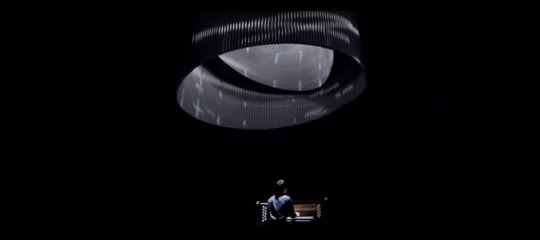
Suga the pianist in the Korean “BST” MV!
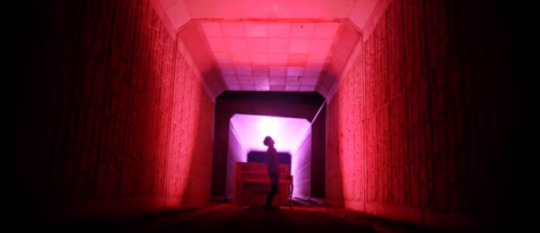
Suga in “BST” with the piano behind him!
Secondly, Suga has a mentor/mentee relationship with two of the members, Jimin and Jungkook.
This relationship works because of a couple of assumptions:
(a) A character’s identity based on Demian changes depending on the member’s relationship to another and that at some point, everyone starts out as a Sinclair. The only character that is fixed is J-Hope’s (See Figure 1: Chart of Relationships below.)
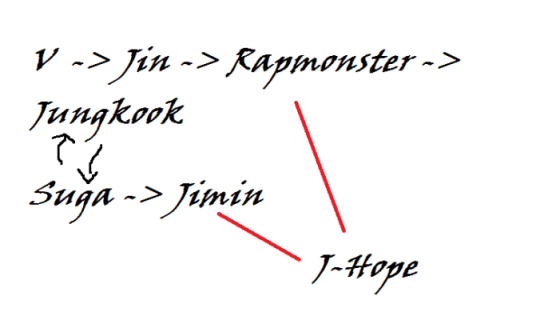
Figure 1: Chart of Relationships
(b) For the Korean “BST”, ““I Need U”, “Run”, and BTS 화양연화 On Stage Prologue, there are different timelines going on.
There will be a memo giving a summary of all the relationships. For now, we will just focus on the Suga/Jungkook and Suga/Jimin pairings as this post is about Suga. The arrow means “influences”. The red line means “connects”. J-Hope connects to everyone. Suga influences Jimin. Jungkook influences Suga and Suga also influences Jungkook.
Suga/Jungkook pairing
In the MVs for “BST” and “Run” and the short clip/teaser for Jungkook’s “Begin”, we see Jungkook and Suga being grouped as a duo. Jungkook is Sinclair and Suga is Pistorius.
In Jungkook’s “Begin” clip, Jungkook holds a drawing of Suga and there is also a drawing of Suga on the wall. We then see a painting in front of Jungkook. It’s hard to tell who that painting is of; it could be Suga, V, or Jungkook. (This will be explained in detail in Jungkook’s post.) In the chapter, Jacob’s Fight with an Angel, which is where Pistorius is introduced, Sinclair also looks at a painting that is of a half-male/half-female. The painting then continues to change forms and Sinclair also claims he had burned it. That’s similar to the short clip.
Now that we see that Suga is connected to Jungkook. We will examine their relationship. Suga and Jungkook only interact with each other in the external reality. In “Run”, Suga is the one that seems to want to start something and Jungkook is restraining him. I think that’s more or less symbolic that Jungkook is somewhat resisting change. It’s analogous to the scene in Demian where Pistorius challenges some moral beliefs that Sinclair held. Sinclair believes that murdering someone you hate is still wrong. Pistorius says that if we want to murder someone we hate, it’s because that person possesses something that we hate within ourselves.
Suga is able to dominate Jungkook who is left on the ground, injured. By Suga throwing a chair at the mirror that shows blue roses in a vase, he is breaking what seems to be the “unattainable”/”mystery” and lets Jungkook see more of the truth.
Blue roses don’t exist in nature. Blue flowers are generally rare (See here for more explanation.) Blue roses can mean mystery, the unattainable/impossible, new opportunities, and new possibilities (See here).
Notice how it’s the mirror that’s broken and not the actual vase of roses; that’s an important distinction because mirrors tend to represent identity, self-consciousness, as well as the “oppositional themes of reality and illusion, candor and deception, logic and disorder, narcissism and self-loathing, symmetry and imbalance, and flattery and harsh indifference” (See here). On one hand, we see a better self and the world that we live in, yet we also see our subconscious self. In art, mirrors are associated with self-knowledge and vanity due to the Narcissus myth. Moreover, in Christian art, mirrors mean the purity of the Virgin Mary (Look here). Breaking that mirror is also breaking the traditional sense of “purity” and destroying what we know as ourselves (ie illusion).
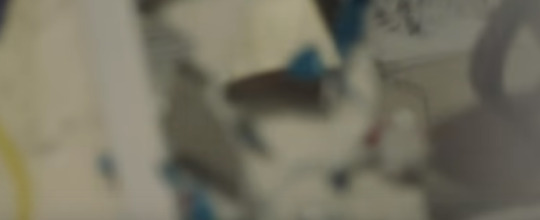
Mirror breaking…not the vase + flowers!
Pistorius also says in the beginning of the chapter to Sinclair: “[Y]ou accuse yourself of taking a road different from most people. You have to unlearn that. Gaze into the fire [. . .] don’t ask whether it’s permitted or would you please your teachers or father, or some god. You will ruin yourself if you do that.” Pistorius is telling Sinclair that Sinclair must break free of what he once believed.
Sinclair eventually says a lot of harsh words to Pistorius like he is antiquated and Sinclair’s friendship with Pistorius comes to an end. Pistorius admits that he still chose to stick with the traditional view of Christianity. Pistorius explains:
I have the desire to become a priest, as you know. I wanted most of all to become the priest of the new religion that we have so many presentiments of. I’ll never be able to–I know that, and I’ve known it for a long time, though I never fully admitted to myself. […] But I must always be surrounded by I feel to be beautiful and holy, organ music and mystery cult, symbol and myth; I need it and I won’t give it up. –That’s my weakness. Because I know at times, Sinclair, I know sometimes that I shouldn’t have such desires, that they represent a luxury and weakness. […] But I can’t (p. 84, Jacob’s Fight with the Angel).
This is like in “BST” where Suga is the one trying to pull Jungkook away from the toilet.
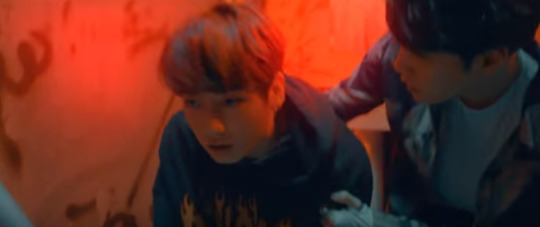
Suga pulling Jungkook away
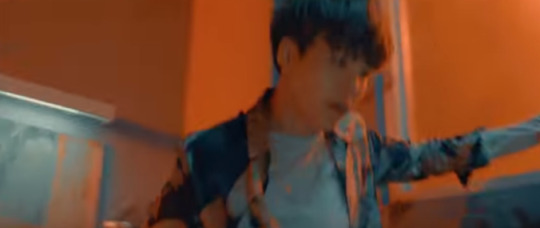
Jungkook pushes Suga away.
Jungkook, in the Korean “BST” MV and in “BST”, ends up succumbing to Rapmonster’s temptation, the absinthe drink. This time it is Jungkook who ironically pushes Suga away and surpasses his mentor. Jungkook is Sinclair and Rapmonster is Demian here. Remember that in the external reality, Suga is still Pistorius to Jungkook, who is also Sinclair.
Suga/Jimin pairing
In the Korean “BST” MV, we only see Suga being paired with Jimin. Suga is the one that’s covering Jimin’s eyes or putting a blindfold on him. Suga is Pistorius and Jimin is Sinclair.
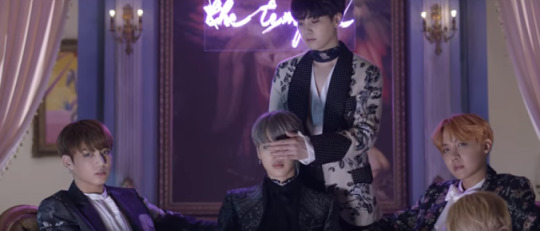
Jimin, as Sinclair, starts out having his eyes covered just by Suga’s hands. He is still not exposed to the harsh reality. Later we move from Rapmonster and Jungkook with the green smoke and up to Jimin and Suga, who are kneeling across from each other. Rapmonster, Demian here, and Jungkook, Sinclair here, are on a level lower than the other two. Pistorius never dives deeper and breaks free from traditional views of the world and Jimin, who is acting as Sinclair here, is at a point where he has just met Pistorius.
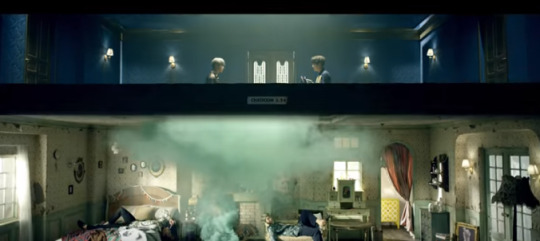
Also notice how Jimin is holding a red apple, while Suga is grasping a black blindfold.
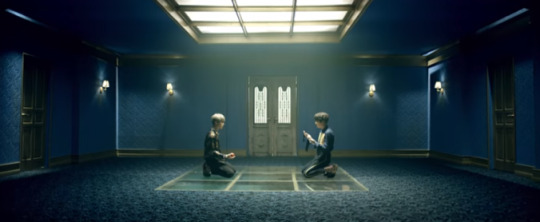
Apple in Jimin’s hand vs black blindfold in Suga’s hands
Blindfolds are important symbols. In Law, Lady Justice wears a blindfold, meaning that a blindfold symbolizes objectivity and impartiality (See here). They can also represent resistance to clarity and mean the interplay between the conscious and the unconscious. Wearing a blindfold symbolises a lesser state of consciousnesses, while taking it off is like an awakening (Source).
The shade black is related to power, authority, death, mystery, evil, rebellion, and strength (Source). In art, the meaning of black changes throughout the periods: in the early Christian period, black was related to evilness, while in the medieval era, it symbolized royalty (Source).
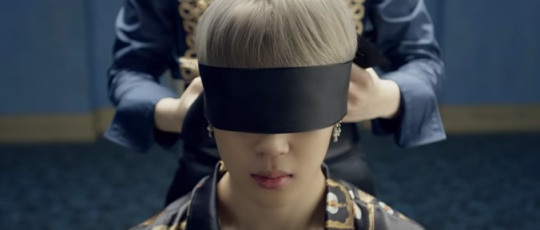
In this case, I think that the black blindfold works to encompass nearly all of the meanings. Jimin is becoming more aware and objective as he wears the blindfold, meaning that he accepts Suga as his mentor. This is like how Sinclair starts to learn from Pistorius. However, by learning from Suga, Jimin is also in a lesser state of consciousness; like mentioned before, Pistorius is still attached to the traditional views of Christianity. There’s power through learning about oneself. There’s a sense of a rebellion from being different from others. There’s also death of one’s old self and mystery in the process of self-discovery. Others might view this change as being evil; hence, Jimin is holding onto that red apple. We know that red apples symbolize the apple from the Garden of Eden. Apples are temptation. Jimin is struggling with temptation here.
Okay, so the question that’s probably lingering in your mind would be this: How can we have two Sinclairs and two Pistoriuses? Remember that we’ve said that the scenes with Jimin, which are filmed in this blue-ish tint, represents the deeper self which is part of the psychical reality.
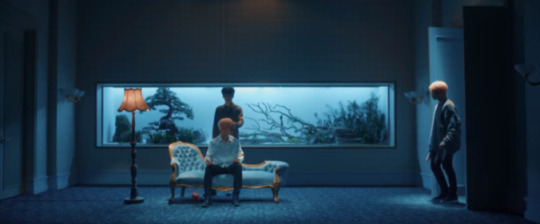
Blue tint!
In fact, Jimin represents all the Sinclairs that are searching for one’s shadow, so you can say that Jimin is an extension of Jungkook, Jin, and Rapmonster.
(Side note: There will be detailed posts about these members later, but for clarity’s sake, a shadow is the unconscious part that we don’t identify with and often associate as the “dark side”.)
If the Pistorius – Sinclair relationship is shown by Suga and Jungkook in the external reality, then that relationship in the inner/psychical reality is depicted by Suga and Jimin.
Finally, Suga is Pistorius because of what’s seen in his short clip: “First Love”. Although it seems like he starts out as Sinclair, he ends up being Pistorius due to his return to his burnt piano. Suga’s MV is positioned at #4 out of the 7 clips. Rapmonster first narrates these lines from the chapter, Beatrice, in Demian.
There are numerous ways in which God can make us lonely and lead us back to ourselves. This is the way he dealt with me at the time.
Beatrice is the chapter that comes before Sinclair meets Pistorius; this is important because it shows that at this point, Suga is kind of like Sinclair. In many ways, Pistorius and Sinclair are quite similar: they are both eccentric and alone and share different views from others. That’s why Rapmonster says those sentences from that chapter where Sinclair has his rebellious stage during boarding school. He goes to bars and gets drunk often.
In the short clip, we see Suga breaking into a store to play the piano until he suddenly stops.
He hears this whistling that attracts him away to the streets that are filled with darkness. A car comes towards him, nearly hitting him. Instead, the car crashes right into the store with the piano. The piano ends up burning. Suga is seen going back to the burning store after he thinks to himself: “Would I have changed? If I had chosen a different path?” (See here. To be honest, I can’t read Korean, so I just have to assume that this translation is accurate. Translation, to me, is an art and you have to be careful about the word you choose to use. In some languages, some words just don’t have the exact meaning in the other language.) Then, Suga watches the burnt piano and stays there.
This whole scene proves that Suga ends up being Pistorius because although he is also attracted to Abraxas like how he follows the whistling and ends up being on that dark street, Suga goes back to the burning piano. We know that the piano/organ is connected to Pistorius. We also know that Pistorius admits that he is not “capable of standing so alone and naked” (Demian). He can’t let go of the past. Suga is running back to what he’s familiar with and what he can’t let go. However, he has already been introduced to the other side and so his piano is burning. He realizes that what he is familiar with isn’t exactly everything that’s meant out to be and that the “New had to be truly new and different”. He recognizes too that he is better served to lead people to self-discovery. The questions too that Suga asks reflect his curiosity about change.
A last point is that in the BTS MVs, Jin is often seen driving a truck, Jungkook is also supposedly hit by a truck in one of the MVs, or the truck carries another member elsewhere. The truck is like a symbol for transporting the members off to somewhere else, to the deeper end. In dreams, a truck is a journey towards one’s goal and is seen as a positive sign (See here). In this case, Suga avoids getting hit by the truck and he also doesn’t fall into a pool of water. The bathtub of water is overflowing, but Suga isn’t in it. Suga is still stuck where he was.
(Side note: In Demian, there’s a lot of symbolism with fire. Pistorius teaches Sinclair concepts in front of a fireplace. Sinclair burns his painting and more. Likewise in the BTS MVs, we will see a lot of symbols related to fire like the cigarette lighter and burning piano.)
(ii) Suga is the Wise Old Man (Archetype).
Jubiemon J: Suga embodies the “knowledge, reflection, insight, wisdom, cleverness and intuition” of the Wise Old Man (Source). When Jimin meets Suga, Jimin learns more about himself. Moreover, Jimin seems to have come to Suga for help in the first place.
Think of the Wise Old Man like Merlin from the legends about King Arthur. In “the phenomenology of the spirit in fairytales” by Carl G Jung, he clarifies that “[t]he figure of the wise old man is observed to appear where insight is needed that the conscious is unable to supply. He continues to explain that in fairytales, the Wise Old Man shows up when the hero is desperate for help and often ask questions to the Hero. Suga also challenges Jungkook in “Run”; we see them fighting with one another. Suga is there when Jungkook is struggling from throwing up in the washroom as seen in “BST”.
(Side Note: The Wise Old Man and Pistorius are thoroughly connected, so this is why this section is shorter.)
(Side Note: I’ve been really enjoying how the short clips have tried their best to integrate not only the meaning of each member’s songs with Demian. Suga’s song, “First Love”, is all about his love for his piano. He raps about how he fell for his piano and then gave it up. Later he returned to loving his piano. I wouldn’t say that Pistorius’ situation is exactly the same as Suga with Pistorius’ feelings towards religion; however, their circumstances are similar.)
As always, feel free to suggest which member you’d like to be analyzed next or to leave comments about your thoughts! Personally, I’m leaning towards analyzing Jimin next as he has been connected to Suga.
Memo: BTS Blood Sweat & Tears (Japanese Version) Music Video Analysis Part 3 We're not a blog that is dedicated to reviewing music (including Kpop), but because we…
#(BTS) WINGS Short Film 4 FIRST LOVE#(BTS) WINGS Short Film 4 FIRST LOVE fan theory#(BTS) WINGS Short Film 4 FIRST LOVE theory#archetypes#Blood Sweat & Tears fan theory#blood sweat & tears theory#blood sweat tears japanese fan theory#Blood Sweat Tears Japanese version analyzed#Blood Sweat Tears Japanese Version MV#blood sweat tears japanese version theory#blood sweat tears mv theory#bts#bts blood sweat tears#bts blood sweat tears japanese mv theory#bts comments#bts demian#bts fan theory#bts first love short film analysis#bts first love short film explained#bts first love suga#bts first love suga short film fan theory#bts first love suga short film theory#bts i need u mv#BTS 피 땀 눈물#bts jimin#bts jungkook#BTS min yoongi#bts mv connections#BTS mv review#BTS MV theories
0 notes